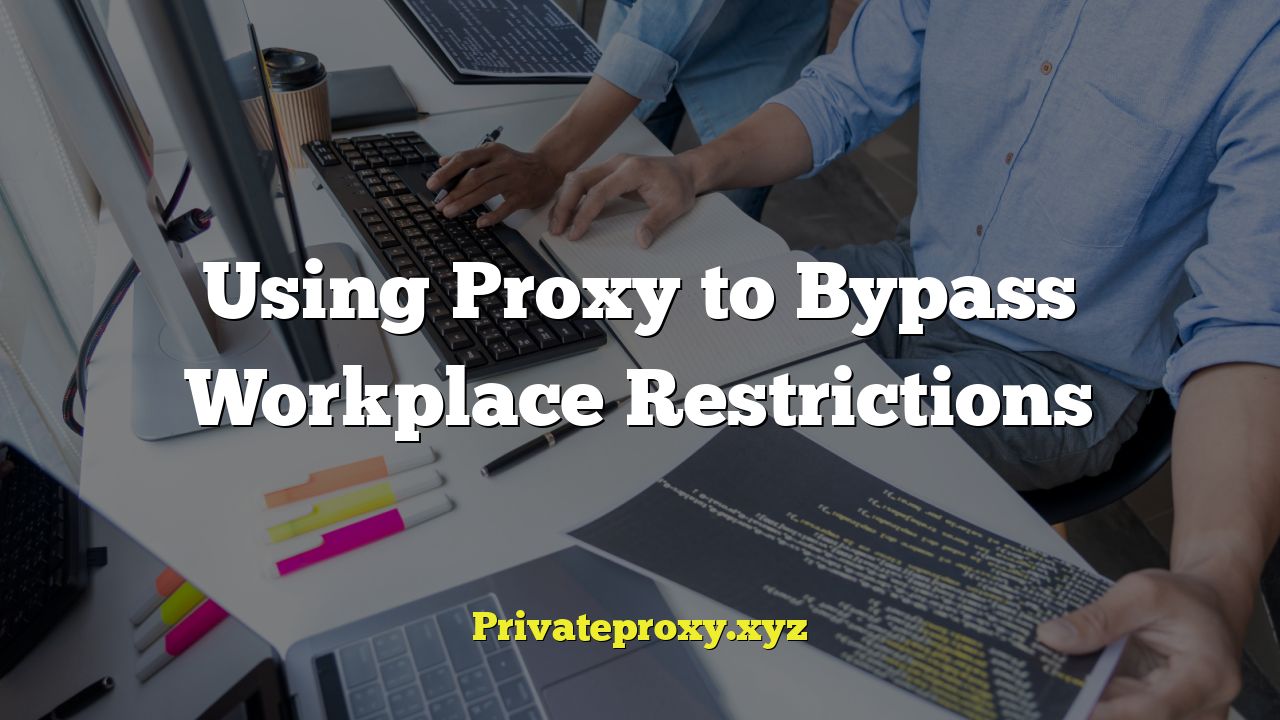
body {
font-family: Arial, sans-serif;
line-height: 1.6;
margin: 20px;
}
h2 {
color: #333;
margin-top: 30px;
border-bottom: 2px solid #eee;
padding-bottom: 5px;
}
ul {
list-style-type: disc;
margin-left: 20px;
}
li {
margin-bottom: 5px;
}
Understanding Workplace Restrictions
In many organizations, network administrators implement restrictions on internet access to maintain productivity, security, and compliance with company policies. These restrictions can take many forms, including:
- Blocking access to specific websites (e.g., social media, streaming services, gaming sites).
- Filtering content based on keywords or categories.
- Limiting bandwidth usage.
- Monitoring browsing activity.
The rationale behind these restrictions is often legitimate. Companies aim to minimize distractions, prevent malware infections, and protect sensitive data. However, these restrictions can sometimes feel overly restrictive, hindering employees from accessing legitimate resources or taking short breaks for personal reasons. This is where the concept of using proxies to bypass these restrictions comes into play.
What is a Proxy Server?
A proxy server acts as an intermediary between your computer and the internet. When you use a proxy, your internet traffic is routed through the proxy server before reaching its destination. The website you’re visiting sees the proxy server’s IP address instead of your computer’s IP address. This indirection provides several potential benefits:
- Anonymity: Hides your real IP address, making it harder to track your online activity.
- Bypassing Restrictions: If a website is blocked for your IP address, using a proxy server with a different IP address can circumvent the block.
- Improved Security: Some proxies offer security features like malware scanning and data encryption.
- Caching: Proxy servers can cache frequently accessed content, potentially speeding up browsing.
However, it’s crucial to understand that not all proxies are created equal. There are different types of proxies, each with its own strengths and weaknesses.
Types of Proxy Servers
Understanding the different types of proxy servers is critical when considering bypassing workplace restrictions. Each type offers a varying level of anonymity and security.
- HTTP Proxies: These are the most common type of proxy and primarily handle web traffic (HTTP and HTTPS). They are relatively easy to set up but offer limited anonymity. The web server knows you’re using a proxy.
- SOCKS Proxies: SOCKS proxies are more versatile and can handle any type of internet traffic, including email, FTP, and peer-to-peer connections. They provide a higher level of anonymity than HTTP proxies because they don’t reveal the type of traffic being transmitted.
- Transparent Proxies: These proxies don’t hide your IP address and are often used by ISPs or network administrators for caching and filtering purposes. They are not useful for bypassing restrictions.
- Anonymous Proxies: These proxies attempt to hide your IP address, but they still identify themselves as proxies. While better than transparent proxies, they may still be detectable.
- Elite Proxies (High Anonymity Proxies): These proxies offer the highest level of anonymity. They don’t reveal your IP address and don’t identify themselves as proxies. They are the most effective for bypassing restrictions and maintaining privacy.
Finding and Using a Proxy Server
Numerous websites and online services offer lists of free proxy servers. However, it’s important to exercise caution when using free proxies, as they may be unreliable, slow, or even malicious. Some free proxies may log your browsing activity or inject advertisements into web pages.
Here’s a general process for finding and using a proxy server:
- Find a Proxy List: Search online for “free proxy list” or “proxy server list.” Be aware of the risks associated with free proxies.
- Test the Proxy: Use a website like “WhatIsMyIP.com” to check if the proxy is effectively hiding your IP address. Also, check the connection speed, as some proxies can significantly slow down your browsing.
- Configure Your Browser:
- Chrome: Go to Settings > System > Open your computer’s proxy settings.
- Firefox: Go to Options > General > Network Settings > Settings.
- Internet Explorer: Go to Tools > Internet Options > Connections > LAN Settings.
Enter the proxy server’s address and port number.
- Verify the Proxy: After configuring your browser, revisit “WhatIsMyIP.com” to confirm that your IP address has changed.
Alternatively, you can use a proxy extension for your web browser. These extensions simplify the process of finding and using proxies.
Ethical Considerations and Risks
While bypassing workplace restrictions may seem tempting, it’s essential to consider the ethical implications and potential risks involved. Bypassing network restrictions could be a violation of company policy, which could lead to disciplinary action, including termination. It’s crucial to review your company’s internet usage policy before attempting to bypass any restrictions.
Furthermore, using proxies, especially free ones, carries security risks. Malicious proxies can:
- Steal your login credentials and other sensitive information.
- Inject malware into your computer.
- Monitor your browsing activity and sell your data to third parties.
Therefore, if you choose to use a proxy to bypass workplace restrictions, it’s crucial to select a reputable and trustworthy proxy service. Consider using a paid VPN service instead of a free proxy, as VPNs generally offer better security and reliability.
VPNs as an Alternative to Proxies
A Virtual Private Network (VPN) provides a more secure and reliable alternative to proxy servers. A VPN encrypts all your internet traffic and routes it through a secure server, masking your IP address and protecting your data from prying eyes. While proxies typically only handle web traffic, VPNs encrypt all traffic from your device, providing a more comprehensive level of security.
Benefits of using a VPN:
- Enhanced Security: Encrypts all your internet traffic, protecting it from eavesdropping.
- Greater Anonymity: Hides your real IP address and location.
- Bypassing Restrictions: Allows you to access blocked websites and services.
However, like proxies, VPNs are not foolproof. Network administrators may be able to detect VPN usage and block VPN connections. Additionally, using a VPN can sometimes slow down your internet speed due to the encryption process.
Detecting and Blocking Proxies and VPNs
Network administrators have various methods for detecting and blocking proxy servers and VPNs. These methods include:
- IP Address Blacklisting: Identifying and blocking known proxy and VPN IP addresses.
- Deep Packet Inspection (DPI): Analyzing network traffic to identify VPN protocols.
- Port Blocking: Blocking common proxy and VPN ports.
- DNS Leak Detection: Identifying DNS requests that reveal the user’s real IP address.
As network administrators become more sophisticated in their detection methods, bypassing restrictions becomes increasingly challenging. The “cat and mouse” game between users trying to bypass restrictions and network administrators trying to enforce them is constantly evolving.
Alternatives to Bypassing Restrictions
Instead of resorting to proxies or VPNs, consider exploring alternative ways to address workplace restrictions. Open communication with your manager or IT department is often the best approach. Explain your need for accessing specific websites or services and see if a compromise can be reached. For example, you might be able to access certain websites during breaks or after work hours.
Other alternatives include:
- Using Mobile Data: If possible, use your mobile data plan to access restricted websites on your smartphone.
- Working Remotely: If your company allows remote work, you can access the internet from your home network, which may not have the same restrictions as the workplace network.
- Suggesting Policy Changes: If you believe that the current internet usage policy is overly restrictive, consider suggesting changes to your manager or HR department.
Conclusion
Using proxies to bypass workplace restrictions can be a tempting solution, but it’s essential to weigh the potential benefits against the ethical considerations and security risks. Understanding the different types of proxies, their limitations, and the methods used to detect and block them is crucial. Before resorting to bypassing restrictions, consider exploring alternative solutions, such as open communication with your manager or IT department. In many cases, a collaborative approach can lead to a more satisfactory outcome for both the employee and the organization. Always remember to prioritize ethical behavior and adhere to company policies to avoid potential disciplinary action.


